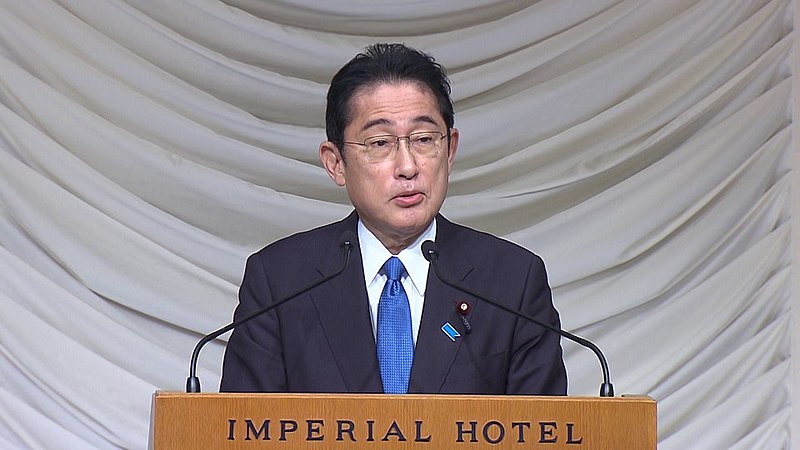Japanese Prime Minister Fumio Kishida dismissed reconstruction minister Kenya Akiba this week. Akiba is the fourth minister in Kishida’s cabinet to be dismissed as the government attempts to shore up public support.
Speaking to reporters on Tuesday, Akiba – who is in charge of the reconstruction of Fukushima and other areas of Japan hit by disasters – said he was submitting his resignation after meeting with Kishida. Akiba’s resignation also follows allegations of mishandling political and election funds as well as ties to the controversial Unification Church, which has come under intense scrutiny this year.
Akiba reiterated that he did not violate any laws related to the issues that he faced backlash for. Instead, Akiba said that he was resigning as he did not want to further trouble the governing Liberal Democratic Party or stall the parliamentary debate with his presence in the cabinet. Akiba is also the fourth minister to leave Kishida’s cabinet since August.
The dismissal of Akiba is seen as an attempt by Kishida to remove the obstacles in passing major budget legislation, including a defense budget that aims to boost Japan’s strike defense capabilities.
“I take the responsibility of appointment very seriously,” said Kishida. “I will keep fulfilling my political responsibility by continuing to tackle a mountain of problems.”
Prior to Akiba, internal affairs minister Minoru Terada resigned in November over a funding scandal. Former reconstruction minister Hiromichi Watanabe will be replacing Akiba in the position, and his appointment will be made official following a palace ceremony.
Kishida’s approval ratings started to decline following the assassination of former Prime Minister Shinzo Abe back in July. The assassination of Abe revealed longtime ties between the governing LDP and the Unification Church, which critics describe as a cult.
Last week, Tokyo unveiled its defense budget for 2023 of a record $55 billion, a 20 percent increase amidst security concerns in the region due to threats posed by China and North Korea. Kishida’s cabinet approved the budget proposal on Friday last week of $863 billion, which increased due to defense spending and higher social security costs due to an aging population.
The new spending target by Japan is in line with the NATO standard and eventually pushes the country’s annual budget to around $73 billion, making Japan the third-largest military spender following the United States and China.



 Iran–U.S. Nuclear Talks in Oman Face Major Hurdles Amid Rising Regional Tensions
Iran–U.S. Nuclear Talks in Oman Face Major Hurdles Amid Rising Regional Tensions  Pentagon Ends Military Education Programs With Harvard University
Pentagon Ends Military Education Programs With Harvard University  Newly Released DOJ Epstein Files Expose High-Profile Connections Across Politics and Business
Newly Released DOJ Epstein Files Expose High-Profile Connections Across Politics and Business  Ukraine-Russia Talks Yield Major POW Swap as U.S. Pushes for Path to Peace
Ukraine-Russia Talks Yield Major POW Swap as U.S. Pushes for Path to Peace  Nighttime Shelling Causes Serious Damage in Russia’s Belgorod Region Near Ukraine Border
Nighttime Shelling Causes Serious Damage in Russia’s Belgorod Region Near Ukraine Border  U.S. Sanctions on Russia Could Expand as Ukraine Peace Talks Continue, Says Treasury Secretary Bessent
U.S. Sanctions on Russia Could Expand as Ukraine Peace Talks Continue, Says Treasury Secretary Bessent  Trump Rejects Putin’s New START Extension Offer, Raising Fears of a New Nuclear Arms Race
Trump Rejects Putin’s New START Extension Offer, Raising Fears of a New Nuclear Arms Race  New York Legalizes Medical Aid in Dying for Terminally Ill Patients
New York Legalizes Medical Aid in Dying for Terminally Ill Patients  U.S.-India Trade Framework Signals Major Shift in Tariffs, Energy, and Supply Chains
U.S.-India Trade Framework Signals Major Shift in Tariffs, Energy, and Supply Chains  Marco Rubio Steps Down as Acting U.S. Archivist Amid Federal Law Limits
Marco Rubio Steps Down as Acting U.S. Archivist Amid Federal Law Limits  Trump Signs Executive Order Threatening 25% Tariffs on Countries Trading With Iran
Trump Signs Executive Order Threatening 25% Tariffs on Countries Trading With Iran  NATO to Discuss Strengthening Greenland Security Amid Arctic Tensions
NATO to Discuss Strengthening Greenland Security Amid Arctic Tensions  U.S. Announces Additional $6 Million in Humanitarian Aid to Cuba Amid Oil Sanctions and Fuel Shortages
U.S. Announces Additional $6 Million in Humanitarian Aid to Cuba Amid Oil Sanctions and Fuel Shortages  Norway Opens Corruption Probe Into Former PM and Nobel Committee Chair Thorbjoern Jagland Over Epstein Links
Norway Opens Corruption Probe Into Former PM and Nobel Committee Chair Thorbjoern Jagland Over Epstein Links  U.S. to Begin Paying UN Dues as Financial Crisis Spurs Push for Reforms
U.S. to Begin Paying UN Dues as Financial Crisis Spurs Push for Reforms  Trump Signs “America First Arms Transfer Strategy” to Prioritize U.S. Weapons Sales
Trump Signs “America First Arms Transfer Strategy” to Prioritize U.S. Weapons Sales  Federal Judge Restores Funding for Gateway Rail Tunnel Project
Federal Judge Restores Funding for Gateway Rail Tunnel Project 





























